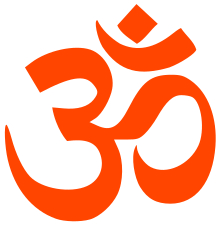Durwakshat Mantra
| Durwakshta Mantra | |
|---|---|
| दूर्वाक्षत मंत्र | |
 | |
| Information | |
| Religion | Hinduism |
| Author | Yajnavalkya |
| Language | Sanskrit |
| Chanted by minimum five elder male Brahmins | |
| Mantra in Shukla Yajurveda | |
| Blessing Mantra chanted in Mithila region | |
Durwakshat Mantra (Sanskrit: दूर्वाक्षत मंत्र) is a blessing mantra chanted in the Mithila region of the Indian Subcontinent.[1][2]
Etymology
[edit]Durwakshta is a compound Sanskrit word having two terms Dūrvā and Akshata. In the Mithila region, the Mantra is chanted by taking the sacred grass Dūrvā and Akshata in hand by Brahmins and at the end of the mantra, the sacred grass Dūrvā and Akshata is thrown on the blessee. Since the sacred grass Dūrvā and Akshata is used by the Brahmins as the material things for blessing in the Mantra, it is known as Durwakshta Mantra.[3]
Description
[edit]In the Mithila region of the Indian Subcontinent, the Durwakshta Mantra is chanted for the blessing in auspicious occasions by minimum five married elder male Brahmins. This mantra is generally chanted on the occasion of marriage, Kojagra,[4] Upanayana and Mundan ceremonies, etc.[1][5][6] It is also known as the Vedic prayer for the nation. In Hindi, it is called "Vedic Rastriya Prarthana".[7][8]
"ॐ आब्रह्मन् ब्राह्मणो ब्रह्मवर्चसी जायतामाराष्ट्र राजन्यः शूर इषव्यौऽतिव्याधि महारथो जायतां दोग्ध्री धेनुर्वोढानड्वानाशुः सप्तिः पुरन्ध्रिर्योषा जिष्णू रथेष्ठाः सभेयो युवास्य यजमानस्य वीरो जायाताम् । निकामे निकामे नः पर्जन्यों वर्षतु फलवत्यो न औषधयः पच्यन्ताम् योगक्षेमो नः कल्पताम्। मंत्रार्थाः सिद्धयः सन्तु पूर्णाः सन्तु मनोरथाः। शत्रुणां बुद्धिनाशोऽस्तु मित्राणामुदयस्तव।"
— Maithil Brahmins, in दूर्वाक्षत मंत्र, Chapter 22 Mantra 22, Madhyandina Samhita, Shukla Yajurveda
The major part of the Durwakshta Mantra is taken from the mantra 22 of the chapter 22 in the Madhyandina Samhita of the Shukla Yajurveda.[9] According to Maithil scholar Gajendra Thakur, the mantra 22 of the chapter 22 in the Shukla Yajurveda was chanted for the devotion towards the Nation in entire Indian subcontinent by people in the early times.
But in the Mithila region, adding "मंत्रार्थाः सिद्धयः सन्तु पूर्णाः सन्तु मनोरथाः। शत्रुणां बुद्धिनाशोऽस्तु मित्राणामुदयस्तव।" after the mantra 22 in chapter 22 of the Shukla Yajurveda became the blessing Mantra in the tradition of Maithil Brahmins.[6]
Translations
[edit]The meaning of the first line of the Mantra can be translate in English as "O God! May a Brahmin teacher who is endowed with the light of knowledge arise in our nation." The translation of the second line of the Mantra is "May there arise brave, skilled archers, great warriors, rulers and soldiers Kshatriyas in our nation." Similarly the translation of the further lines of the Mantra in English is "In our nation, the Yajman's cow should be milky, the bull should be able to carry loads, and the horse should be swift. Women should be endowed with all virtues. Let all the charioteers be victorious, mighty and Yajman's sons be civilized. Let the clouds rain from time to time as needed in our nation. May crops and medicines mature with fruit and flowers. Yoga and Kshema should be practiced in the best manner in our nation. May the meanings of the mantras be fulfilled and may the desires be fulfilled. May the intelligence of your enemies be destroyed and your friends rise."
References
[edit]- ^ a b Jha, Bhavanath (2019-09-08). "मिथिलाक परम्परामे दूर्वाक्षतक मन्त्र". Brahmi Publication. Retrieved 2024-09-17.
- ^ Mishra, Mayand (1999-01-01). Purohit (in Hindi). Rajkamal Prakashan. ISBN 978-81-7178-723-4.
- ^ "दूर्वाक्षत के हिंदी अर्थ | durwakshat - meaning in Hindi | हिन्दवी डिक्शनरी". Hindwi Dictionary (in Hindi). Retrieved 2024-09-18.
- ^ "कोजागरा की तैयारियों में जोर-शोर से जुटे मिथिलावासी -". Jagran (in Hindi). Retrieved 2024-09-18.
- ^ Bharat, E. T. V. (2021-10-19). "Kojagara festival celebrated with pomp in Mithilanchal of Bihar". ETV Bharat News. Retrieved 2024-09-17.
- ^ a b Thakur, Gajendra. मैथिली समीक्षाशास्त्र (भाग-२, अनुप्रयोग) (in Hindi). Videha eJournal [विदेह Videha (since 2000) ISSN 2229-547X VIDEHA (since 2004) www.videha.co.in ]. pp. 144–145. ISBN 978-93-340-2393-0.
- ^ "संस्कारित भाषा का प्रचार-प्रसार है यशश्री का जुनून -". Jagran (in Hindi). Retrieved 2024-09-18.
- ^ Dvivedī, Kapiladeva (1982). Vedāmr̥tam: Sukhī samāja (in Hindi). Viśvabhāratī Anusandhāna Parishad. pp. 8–9.
- ^ "Samhita Patha 21-30 – Adhyaya – 22 | Vedic Heritage Portal". vedicheritage.gov.in. Retrieved 2024-09-17.
